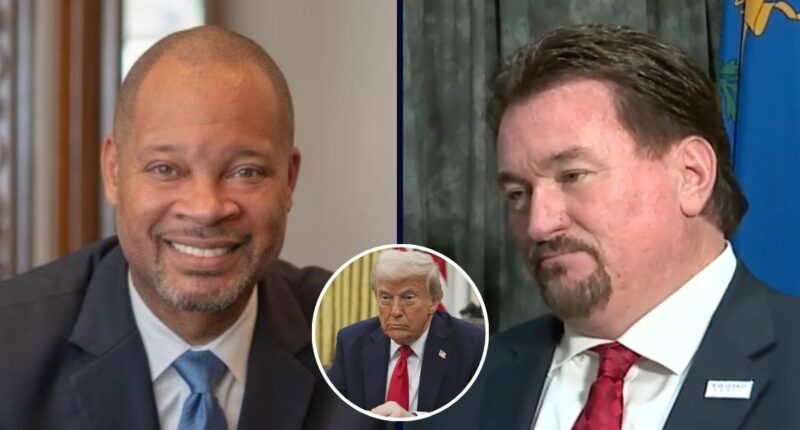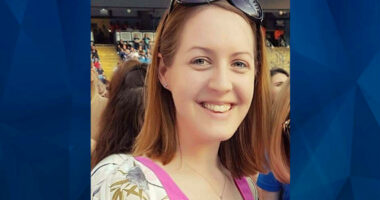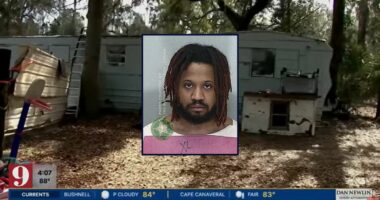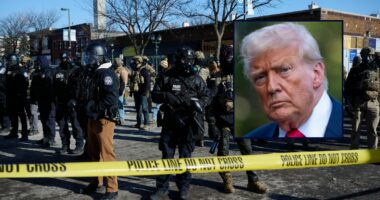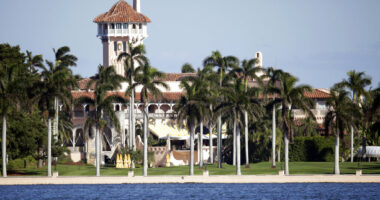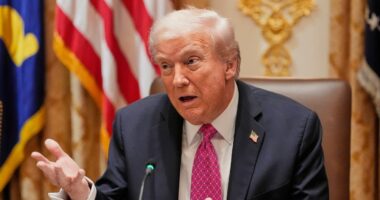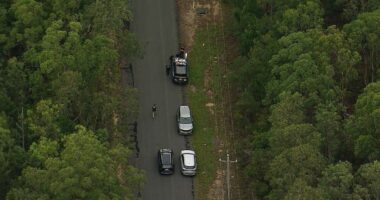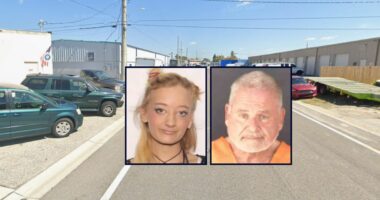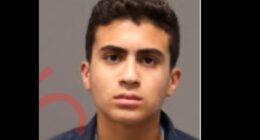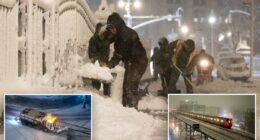Share this @internewscast.com
Left: Nevada Attorney General Aaron Ford (Nevada Attorney General”s Office). Right: Chairman of the Nevada Republican Party Michael McDonald (KLAS/YouTube). Inset: President Donald Trump listens to a question from a reporter before signing an executive order in the Oval Office of the White House in Washington, Monday, March 31, 2025 (Pool via AP).
The Nevada Supreme Court has given the green light for the prosecution of “fake electors” accused of falsely certifying that Donald Trump won the 2020 presidential election, allowing the case to proceed in Clark County.
This ruling overturns a previous decision by a Nevada district court, which had dismissed the case on the grounds that Clark County was not the appropriate jurisdiction. In a 12-page order issued Thursday, the justices declared the district court’s conclusion as erroneous, mandating that the case continue in Clark County, home to Las Vegas.
Nearly five years have passed since Joe Biden’s victory over Trump in the 2020 election, with pivotal states like Nevada playing key roles. Despite this, groups of so-called fake electors in multiple states attempted to certify an alternate outcome in favor of Trump.
In the case of Nevada, six individuals, including the state’s Republican Party Chairman Michael McDonald, sent “false electoral vote certificates” from Douglas County to the federal courthouse located in Clark County. These actions led to their indictment on charges related to issuing forged documents and attempting to file false or forged documents in a public office.
The defendants have pleaded not guilty and sought to have the indictment dismissed, arguing that the alleged crime was completed upon mailing and that no further action took place in Clark County, as the documents were transferred unopened to Reno in Washoe County.
Initially, the district judge ruled in favor of the defendants, but the state appealed, bringing the matter before the Nevada Supreme Court, which has now decided to let the case proceed.
Nevada Attorney General Aaron Ford and his office have argued that the alleged transgressions undertaken by the “fake electors” were not complete upon mailing because “at that point, the documents had not been delivered to a recipient or presented for acceptance.” Furthermore, to the prosecutors, although the mail was rerouted, because it first arrived in Clark County, the site is the proper venue for the case.
The state’s high court found credence in this argument.
“We agree with the State that Clark County was a proper venue because the offenses involved false statements directed to Judge [Miranda] Du at the federal court in Las Vegas,” the justices wrote. “Respondents directed the documents to be sent to the federal court in order to perpetrate a fraud there.”
They concluded by writing, at length:
“The district court erred in concluding that the offenses were complete upon depositing the documents for mailing in Douglas County and thus in concluding that Clark County was an improper venue. The offenses charged anticipated the documents’ receipt and sought to induce or persuade a recipient to take action by accepting them as true. As they were addressed to and delivered at the federal court in Las Vegas, venue properly laid in Clark County to prosecute the crimes alleged. We reverse the order dismissing the criminal indictment and remand to the district court.
Clark County went for Biden in 2020, while Trump swept Douglas County that year; in the end, Nevada’s electoral votes went to Biden. Ford celebrated the news, saying in a statement, “The 2020 fake electors cannot evade accountability in Nevada for their unlawful actions,” per The Nevada Independent. “With this ruling, we will return to the Eighth Judicial District Court in Clark County and continue our work to ensure that justice is served.”
It is also a victory for those in swing states who have sought to prosecute the people they allege tried to unconstitutionally overturn the will of the voters at the ballot boxes.
Such efforts have failed in other states. In Michigan, the case against 15 “fake electors” was thrown out after a district judge there ruled that they “seriously believed” there were problems with the election. In Arizona, the case against 18 defendants hit a road block when a judge found that the grand jury that issued the indictment had not been given the requisite information on how electoral votes should be counted.
